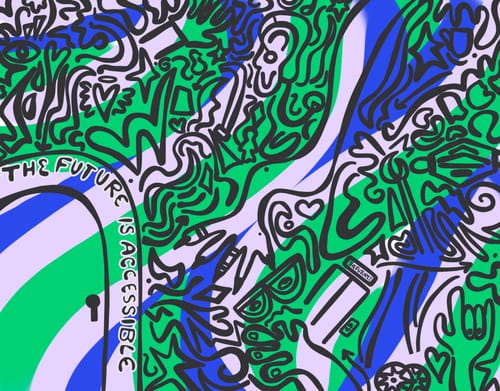We do not have to be everyone’s educator all of the time, 24 hours a day, 7 days a week.
From the moment I entered this world, I was deemed an educator…against my will.
One of my first memories as a young kid is a stranger coming up to me and asking, “What happened to your legs?”
Being too shy and embarrassed my mother kindly answered for me: “He was born with a genetic disease that caused the muscles in his legs not to work so they were amputated.”
I remember being flushed with relief that it was over and grateful that she spoke up for me. What I didn’t realize was that it was going to happen again and again and again, and the questions were only going to get more invasive.
It wasn’t just random strangers but it would be doctors and nurses and everyone else in between.
My parents, who were in their early 20’s living in a small town in Wyoming in the United States - while they were financially ready to have a child, they were not ready to have a child that would need two major surgeries before the age of 6. Thanks to the help of the Shriners Hospital in Salt Lake City, UT my parents didn’t have to carry that financial difficulty.
But after my surgeries, during our yearly check-ups at the hospital, I was forced to be their educator…without my consent.
It often felt like I was on American Idol. It was this huge room and at the front was a long table where 3-4 doctors and nurses sat asking intrusive questions about my body and how things were going. I would be forced to “perform” and show them how I was getting around either on my hands, or in my wheelchair, or by using the loathsome prosthetics that were not working for me because as they put it, “every kid wants to walk.”
This never made sense to me because walking on my hands felt normal to me so why did I NEED to use prosthetics.
Then there was a point where I would have to take off my clothes and let them examine my body. I have no memory of anyone ever asking for my consent or if that was ok. I learned at a very young age that the expectation as a disabled person was to educate everyone else on why I was disabled.
For a while, I accepted my fate and leaned into sharing my story with whatever random stranger felt compelled to ask me at the grocery store, movie theatre, mall, or any other place out in the community.
As I got older the questions only got more invasive. People felt it was ok to ask me–a complete stranger–about my genitals, digestive system, and reproductive abilities before they even asked me my name.
A few times I tried to politely say that my body and how it functions is none of their business but I would get frustrated and often angry responses like: “Well, how else are we supposed to learn about people like you if you’re not willing to educate us.”
So, I gave up and accepted my fate.
I turned to social media using my platform of 4.5 million followers on TikTok and close to half a million followers on Instagram to educate folks on my body and experience as a queer disabled person.
Still, no matter how many times I answered the same questions over and over again they just kept coming.
Then I had a revelation and honestly, I can’t remember who I discovered it from. It could have been Alice Wong, or Judy Heumann or Leah Lakshmi Piepzna-Samarasinha or one of the many other incredible disabled activists but one of them said, “we do not have to be everyone’s educator all of the time, 24 hours a day, 7 days a week.”
This was a radical and revolutionary idea to me. Not only could I say no, but it was also completely acceptable to say no. I had no idea this was an option!
This radical concept made me feel seen and gave me autonomy over my own story. I created a rule that in educational spaces that have been set up by me (in person and online), I am happy to share information about my body and answer questions that I deem appropriate. But when I am out and about in the community as Spencer–not as an educator–I could absolutely decline the opportunity to share my story with a stranger.
It helped me contextualize that so many people, specifically complete strangers, had been asking me to share and relive personal trauma in front of them without consent all in the name of “education.”
I understand that many disabled folks are totally fine answering these questions and I love that for them but for me and anyone else who doesn’t want to, I am giving you permission to say no.
– Spencer West
The Disability Files is a quarterly dispatch where we invite Deaf and Disabled artists and creatives to share their stories about art, access, and everything in between.
💌 If you like what we're doing, please help spread the word and forward this email to your friends!
✅ If you received this email from a friend and want to subscribe, you can do that here.
🎨 If you're an artist or creative with a disability, you can subscribe to The Disability Files for free here!








